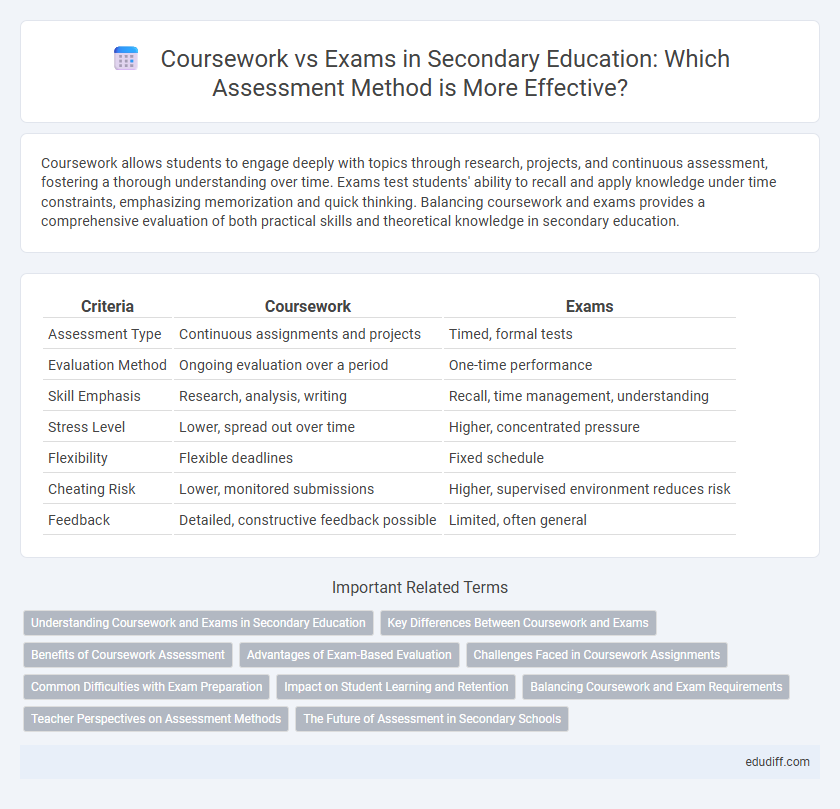Coursework allows students to engage deeply with topics through research, projects, and continuous assessment, fostering a thorough understanding over time. Exams test students' ability to recall and apply knowledge under time constraints, emphasizing memorization and quick thinking. Balancing coursework and exams provides a comprehensive evaluation of both practical skills and theoretical knowledge in secondary education.
Table of Comparison
| Criteria | Coursework | Exams |
|---|---|---|
| Assessment Type | Continuous assignments and projects | Timed, formal tests |
| Evaluation Method | Ongoing evaluation over a period | One-time performance |
| Skill Emphasis | Research, analysis, writing | Recall, time management, understanding |
| Stress Level | Lower, spread out over time | Higher, concentrated pressure |
| Flexibility | Flexible deadlines | Fixed schedule |
| Cheating Risk | Lower, monitored submissions | Higher, supervised environment reduces risk |
| Feedback | Detailed, constructive feedback possible | Limited, often general |
Understanding Coursework and Exams in Secondary Education
Coursework in secondary education allows students to demonstrate understanding through projects, essays, and practical tasks, emphasizing continuous learning and skill application. Exams primarily assess knowledge retention and problem-solving under timed conditions, often focusing on theoretical understanding and recall. Balancing coursework and exams provides a comprehensive evaluation of a student's academic abilities and learning progress.
Key Differences Between Coursework and Exams
Coursework involves continuous assessment through assignments, projects, and presentations, allowing students to demonstrate understanding over time. Exams are time-restricted tests that evaluate knowledge and problem-solving skills under pressure, usually at the end of a course. Coursework emphasizes depth and application, while exams prioritize recall and time management.
Benefits of Coursework Assessment
Coursework assessment enhances deep learning by encouraging consistent effort and practical application of knowledge over time, unlike exams which often emphasize memorization. It allows for personalized feedback, helping students develop critical thinking and research skills essential for academic growth. Coursework also reduces exam-related stress and better accommodates diverse learning styles, promoting a more inclusive evaluation process.
Advantages of Exam-Based Evaluation
Exam-based evaluation in secondary education offers a standardized method to objectively assess students' understanding and knowledge retention across diverse subjects. It facilitates quick and comprehensive measurement of academic performance, enabling educators to identify learning gaps efficiently. High-stakes exams also prepare students for future challenges by fostering time management and stress resilience skills essential for higher education and professional environments.
Challenges Faced in Coursework Assignments
Coursework assignments often present challenges such as time management difficulties, requiring students to juggle extensive research, drafting, and revision within set deadlines. The need for consistent self-discipline and effective planning can impact the quality of work and overall performance. Additionally, varying assessment criteria and complex subject matter increase the cognitive load, demanding higher-order thinking and problem-solving skills.
Common Difficulties with Exam Preparation
Exam preparation challenges often include ineffective time management, leading to insufficient revision periods and increased anxiety. Common difficulties involve balancing coursework demands with exam study, resulting in fragmented focus and reduced retention of material. Additionally, students frequently struggle with identifying key topics and practicing past papers, which are essential for mastering exam formats and improving performance.
Impact on Student Learning and Retention
Coursework fosters continuous engagement with material, enhancing long-term retention through consistent practice and deeper understanding of concepts. Exams, while effective in assessing knowledge recall under pressure, may encourage short-term memorization rather than meaningful learning. Combining both methods optimizes student learning by balancing sustained study habits with performance evaluation.
Balancing Coursework and Exam Requirements
Balancing coursework and exam requirements in secondary education demands effective time management and prioritization skills to ensure comprehensive subject mastery. Students should allocate study hours proportionally, emphasizing coursework for continuous assessment and exams for final evaluation to optimize academic performance. Incorporating regular review sessions and practice exams enhances retention and readiness for both assessment forms.
Teacher Perspectives on Assessment Methods
Teachers often prefer coursework over exams for assessing secondary students as it provides a comprehensive understanding of their abilities through continuous evaluation and practical application. Coursework allows educators to gauge critical thinking, creativity, and problem-solving skills beyond rote memorization, which exams typically emphasize. This ongoing assessment method also helps identify individual learning needs and fosters a more personalized teaching approach.
The Future of Assessment in Secondary Schools
The future of assessment in secondary schools is shifting towards a balanced integration of coursework and exams, promoting deeper understanding and critical thinking skills. Emphasis on continuous assessment through coursework allows for personalized learning and ongoing feedback, while exams provide a standardized measure of knowledge retention and application. Innovations in digital assessment tools will further enhance the accuracy and fairness of evaluating student performance in diverse educational settings.
Coursework vs Exams Infographic

 edudiff.com
edudiff.com